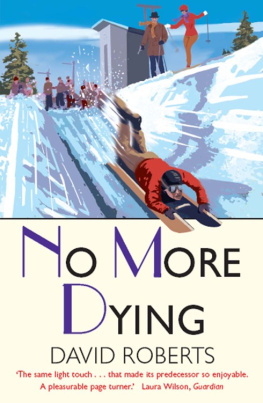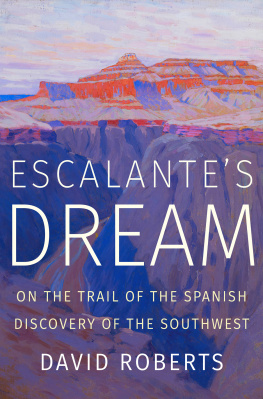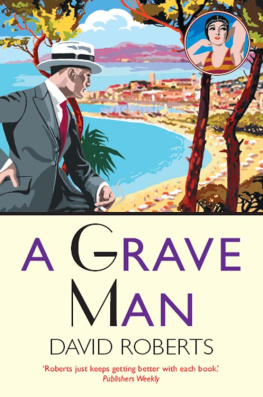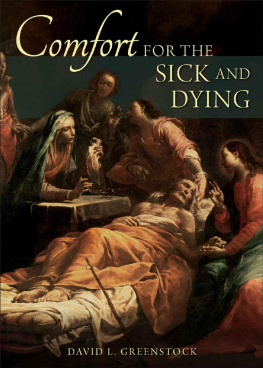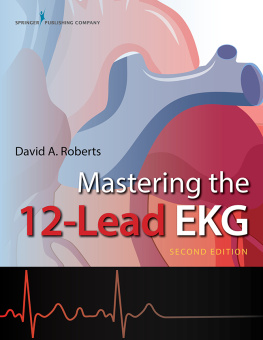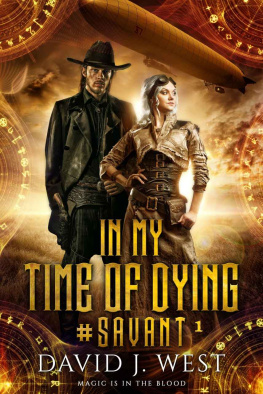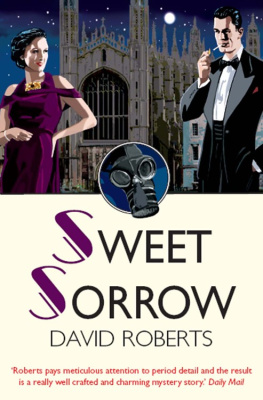David Roberts - No More Dying
Here you can read online David Roberts - No More Dying full text of the book (entire story) in english for free. Download pdf and epub, get meaning, cover and reviews about this ebook. year: 2009, publisher: Constable & Robinson Limited, genre: Art. Description of the work, (preface) as well as reviews are available. Best literature library LitArk.com created for fans of good reading and offers a wide selection of genres:
Romance novel
Science fiction
Adventure
Detective
Science
History
Home and family
Prose
Art
Politics
Computer
Non-fiction
Religion
Business
Children
Humor
Choose a favorite category and find really read worthwhile books. Enjoy immersion in the world of imagination, feel the emotions of the characters or learn something new for yourself, make an fascinating discovery.
- Book:No More Dying
- Author:
- Publisher:Constable & Robinson Limited
- Genre:
- Year:2009
- Rating:4 / 5
- Favourites:Add to favourites
- Your mark:
- 80
- 1
- 2
- 3
- 4
- 5
No More Dying: summary, description and annotation
We offer to read an annotation, description, summary or preface (depends on what the author of the book "No More Dying" wrote himself). If you haven't found the necessary information about the book — write in the comments, we will try to find it.
No More Dying — read online for free the complete book (whole text) full work
Below is the text of the book, divided by pages. System saving the place of the last page read, allows you to conveniently read the book "No More Dying" online for free, without having to search again every time where you left off. Put a bookmark, and you can go to the page where you finished reading at any time.
Font size:
Interval:
Bookmark:
D AVID R OBERTS worked in publishing for over thirty years before devoting his energies to writing full time. He is married and divides his time between London and Wiltshire.
Visit www.lordedwardcorinth.co.uk to find out more about David and the series.
Praise for David Roberts
A classic murder mystery with as complex a plot as one could hope for and a most engaging pair of amateur sleuths whom I look forward to encountering again in future novels.
Charles Osborne, author of
The Life and Crimes of Agatha Christie
Dangerous Sea is taken from more elegant times than ours, when women retained their mystery and even murder held a certain charm. The plot is both intricate and enthralling, like Poirot on the high seas, and lovingly recorded by an author with a meticulous eye and a huge sense of fun.
Michael Dobbs, author of
Winstons War and Never Surrender
Roberts use of period detail... gives the tale terrific texture. I recommend this one heartily to history-mystery devotees.
Booklist
The plots are exciting and the central characters are engaging, they offer a fresh, a more accurate and a more telling picture of those less placid times.
Sherlock
Titles in this series
(listed in order)
Sweet Poison
Bones of the Buried
Hollow Crown
Dangerous Sea
The More Deceived
A Grave Man
The Quality of Mercy
Something Wicked
No More Dying
Sweet Sorrow

Constable & Robinson Ltd
3 The Lanchesters
162 Fulham Palace Road
London W6 9ER
www.constablerobinson.com
First published in the UK by Constable, an imprint of
Constable & Robinson Ltd 2008
This paperback edition published by Robinson, an imprint of
Constable & Robinson Ltd 2009
Copyright David Roberts 2008, 2009
The right of David Roberts to be identified as the author
of this work has been asserted by him in accordance with the
Copyright, Designs and Patents Act, 1988.
All rights reserved. This book is sold subject to the condition that it shall not, by way of trade or otherwise, be lent, re-sold, hired out or otherwise circulated in any form of binding or cover other than that in which it is published and without a similar condition including this condition being imposed on the subsequent purchaser.
A copy of the British Library Cataloguing in
Publication Data is available from the British Library
UK ISBN: 978-1-84529-690-2 (hbk)
UK ISBN: 978-1-84529-906-4 (pbk)
eISBN: 978-1-78033-422-6
Printed and bound in the EU
1 3 5 7 9 10 8 6 4 2
For the two Georges
I am most grateful to Lord Brabazon of Tara and Gary Lowe for instructing me in the mysteries of the Cresta Run. Philip Truett knows everything there is to know about Huntercombe Golf Club, and I must also thank Nicholas Courtney who is knowledgeable on a whole range of abstruse subjects.
So shalt thou feed on Death, that feeds on men,
And Death once dead, theres no more dying then.
Shakespeare, Sonnet 146
It cannot be but he was murderd here;
The least of all these signs were probable.
Shakespeare, Henry VI
February and March 1939
In the thick fog a pea-souper, they called it Verity Browne nosed her way down unfamiliar streets, her handkerchief to her mouth, dodging the cars and buses which loomed, yellow-eyed and sinister, out of the Stygian gloom. She was looking for Ransom Street, which she knew to be in the maze of narrow alleys behind Warren Street underground station. She strained to see the street names, half-tempted to give it up and return home. The doctor had warned her not to go out in fog as she was not yet fully recovered from tuberculosis and her lungs were still sensitive to polluted air. She had been lucky. It had not been a serious infection but she knew it was foolish to take chances. She asked herself wryly why she had left her gas mask behind.
It was an indication of the dangerous political situation in Europe that, despite Prime Minister Neville Chamberlains every effort to appease Hitler, Sir John Anderson who was in charge of Air Raid Precautions the ARP had begun to issue gas masks in anticipation of poisonous gas attacks from the air. Trenches were being dug in the Royal Parks, anti-aircraft gun emplacements hurriedly constructed against the anticipated bombardment by the Luftwaffes supposedly invincible planes. Primitive bomb protection shelters, six feet by four, made from six curved sheets of corrugated iron, were being distributed to any house with a back or front garden into which a shelter could be buried. Londoners were resigned to their fate, only asking that the strain of waiting and imagining the unimaginable should at last be over.
Veritys goal was a branch or group meeting of the Communist Party and she felt nervous, like a lapsed Catholic seeking out a mass against her better judgement. She retained only a residual loyalty to the Party. It was no longer the band of brothers she had joined in a state of almost religious fervour in 1934. Then she had anticipated becoming an unimportant foot soldier in an army of like-minded seekers after truth, attempting to hold back an inexorable wave of Fascist terror. Spains democratically elected government was facing an army in rebellion, supported by the Roman Catholic Church. The International Brigade had been raised to fight for the Republican cause volunteers drawn mostly, but not exclusively, from the working classes of many countries rallying to the aid of their oppressed Spanish brothers. It had been a logical and thrilling extension of the Partys defiance of Fascism.
They had been defeated. That was bitter enough. Only a few nights ago she had been at Victoria station to welcome back the pathetic remnants of that proud army of idealists, but the worst of it was that she had seen the Party turn on itself, gnawing at its own entrails. It had been betrayed by its leaders the cause subverted by devious and unprincipled apparatchiks. The International Brigade, which had gone to Spain to fight for justice and liberty, had been a chaotic amalgam of Communists, socialists, Trotskyists, anarchists and trades unionists. The Communists, on the orders of their paymasters in Moscow, had rejected this communion. They had purified the Party of dissident elements with the grim determination of the religious extremist. Anyone who refused to accept unquestioning obedience to Moscow was liquidated.
Verity had never counted obedience among her virtues, preferring independence of thought and action, so she had gradually, though reluctantly, distanced herself from the movement she had joined with such high hopes. She still counted herself a Communist but was seriously thinking of turning in her Party card. However, if anything of the original Party remained, it was to be found in these local meetings where fifteen or twenty comrades gathered together to hear the word preached to them.
She had three special reasons for braving the fog and bitter chill. In the first place she liked and admired the District Secretary, George Castle, a locomotive driver, and his wife Mary. It was in their house that the meeting was being held and this was the first time Verity had visited their new home. When they had first been married, they had lodged in a stinking tenement near the railway line but, painfully slowly, they had saved enough money to rent their new respectable, rat-free abode.
In the second place she had been asked no, ordered to be there by David Griffiths-Jones. He was a senior Party figure and had once, briefly, years before, been her lover; in fact, she smiled apologetically to herself, he had been her
Next pageFont size:
Interval:
Bookmark:
Similar books «No More Dying»
Look at similar books to No More Dying. We have selected literature similar in name and meaning in the hope of providing readers with more options to find new, interesting, not yet read works.
Discussion, reviews of the book No More Dying and just readers' own opinions. Leave your comments, write what you think about the work, its meaning or the main characters. Specify what exactly you liked and what you didn't like, and why you think so.

